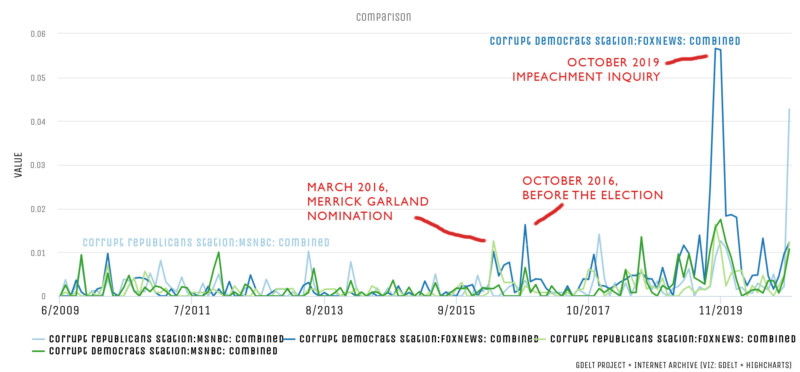Sign up for the daily CJR newsletter.
The end of the Trump administration will mean the end of the equilibrium between MSNBC and Fox News. The furious pro-Trump Godzilla of the right, vs. the condescending Mothra of the West Wing left—that movie is over. What will take its place?
“Scylla is the cost of actually covering the news, and Charybdis is the lack of a new must-watch story line to plump ratings,” Harry Siegel, senior editor at the Daily Beast, told me. “If I’m a TV exec, I’m praying for a good war.”
In response to the same question, New York Times media columnist Ben Smith replied, almost instantaneously, “I assume they need similar drama and will elevate the Democratic left to kind of deliver it? AOC vs. Biden?”
A reasonable guess, but I sure hope not. It’s telling that these expert media analysts assume as a matter of course that “drama” and “ratings” will continue to determine how MSNBC covers the news—or, more accurately, how it does business. But the network has a real chance, in this crisis moment, to get past “similar drama” and commit to giving viewers the news we urgently need. I hope MSNBC seizes that chance with both hands.
To confront the history of Fox vs. MSNBC—the poles that have dominated this era—is to begin to comprehend the true cost of the status quo. The seed of it, a jokey, vapid-but-superficially-harmless TV rivalry, slowly unfolded into a violently polarized atmosphere that eventually portended literal blood in the streets. To contemplate that rivalry from end to end is to see what we risked, what we lost as a result, and what cable news needs to do now.
Tucker Carlson, Fox News’s biggest ratings draw, and perhaps its most extremist right-wing voice, was on MSNBC himself in the fall of 2006. Rachel Maddow appeared often on his show back then, as a fun, intelligent representative of “the other side,” shining with lip gloss and quips. And back then it was just fine for these kids (look how young they were!) to crack wise about Democrats’ plans to “make everybody get gay-married” and also “send [Carlson] to Guantánamo.” The two of them had a good laugh over that.
But the hunger strikes and the allegations of torture at Guantánamo went conveniently unmentioned. And that is how “both sides” on cable news worked back then, and continued to work; on topic after topic, the same pattern of neglect emerged with respect to serious left-identified issues, such as climate change (which Chris Hayes, one of the few anchors who’s focused on it, once called “a ratings killer”) and Medicare for All (“politically stupid,” according to Joe Scarborough).
As Fox grew more and more accommodating to the authoritarian tendencies of the Republican Party, MSNBC struggled to find a coherent response to the mounting tension. By the time the Tea Party had metastasized into the Trump administration, many Fox personalities were comfortable with characterizing all Democrats—and, later, all non-Trump-supporting Republicans—as enemies and traitors. The old détente had morphed into something angrier and weirder, something that’s really not funny anymore. Carlson and Maddow can no longer appear on the same show.
Tucker Carlson Tonight debuted on Fox just a few days after Trump’s election. The genial, bow-tied preppy gave way to a stern-faced, fear-stoking demagogue, perma-furrowed brows set to stun, bellowing about how Congresswoman Ilhan Omar is a “parody of repulsiveness” and warning retirees that they too might be targeted for surveillance by the FBI, just like General Michael Flynn. “This isn’t about Michael Flynn: It’s about YOU!” Turns out it’s not just a movie; Godzilla wants to incinerate Mothra for real.
In an attempt to trace out these rising levels of partisan hostility, I made a chart on GDELT comparing the frequency of the phrases “corrupt Republicans” and “corrupt Democrats”—just to choose a commonly hurled imprecation—for the decade from the beginning of the Obama administration through the Trump administration, on Fox and MSNBC.
Before I looked at this, I’d have guessed that the numbers around this election would look roughly equal to the numbers around the furious days of the Garland nomination. But I would have been way, way off. It really makes you wonder, looking at this chart, how even the most jaundiced viewer’s political judgment might become warped, sensationalized, through a steady diet of cable news.
In December 2019 Maddow aired a segment on torture drawings made by a Guantánamo prisoner who’d been waterboarded eighty-three times. She delivered a thoughtful and effective consideration of a story too long neglected since the days of her lighthearted banter with Carlson. MSNBC taking other serious things seriously again would be a most welcome step forward.
“In this reset moment,” Margaret Sullivan of the Washington Post told me, “I’d like to see all the cable networks get back to basics, by which I mean: reporting. More feet on the street, more emphasis on investigations, more holding public officials accountable, more deeply informed analysis.
“I understand that outrage sells, but it’s usually not what serves the public interest best.”
The audience has to mean more to MSNBC than numbers to add to a ratings figure. We viewers are real people with real problems, plus a disturbing temptation to take what we see on television as representative of the world beyond our own walls.
Serving us something more substantive is a risk. But the return to “similar drama” may be an even worse one.
Tom Scocca, the Slate politics editor, could not offer me a prediction as to the future of MSNBC vs. Fox because, as he said, “I do not watch cable news at all.” A few moments later he wrote back to clarify: “I might have used one or another of them to stream a debate at some point but I turn it off whenever anyone in a studio starts yapping.”
Has America ever needed a media defender more than now? Help us by joining CJR today.









